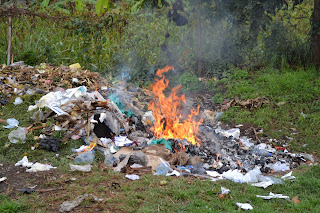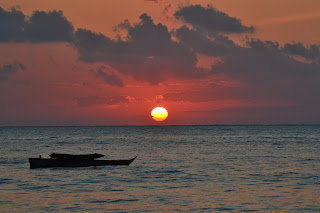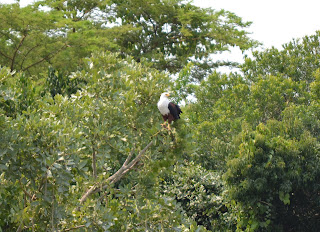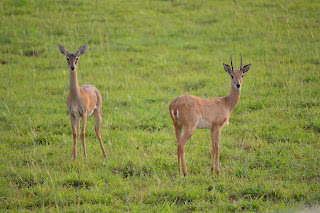Tuesday, July 19, 2011
Friday, July 15, 2011
On the Outskirts of Town
Thursday, July 14, 2011
Wednesday, July 13, 2011
Rafting the Nile




Sunday, July 10, 2011
Jambiani
Zanzibar
I just wanted to try to put up some pictures of our trip through Zanzibar last week. These pictures don't come close to doing justice to the beauty of this place, but maybe it will give you a little peak at some of the things we saw and experienced...


Each night local fishermen set up tables like this in the park. All kinds of sea food like lobster, fish, crab, even octopus could be found.

Tuesday, July 5, 2011
QUick Update

On Friday, Will and I arrived in Dar es Salaam, Tanzania via Uganda Air. In Kampala, people often joke about the inefficiency of the many systems. I have to say that Ugandans do a much better job when it comes to customs. It was a bit scary clearing customs in Dar es Salaam. An officer took our passports, visa money, and put it in a stack with about 10 others. We then waited for our names to be called. It seemed as if everybody was being called but us. After what seemed to be an hour (it was probably closer to 30-45 minutes but because they had taken our passports away, it created angst, at least for me.). Finally, we were released from the holding area, picked up our luggage, and took a taxi to a hotel - the Safari Inn. It cost us $30 for both of us to stay the night, which was a great deal.
Thursday, June 30, 2011


On Saturday night, Will, Nicholas (from EAC not T4T), and I went to The National Theater to see the Tabu Flo Dance troupe perform a show called The Myth of the Night Dancers. Night dancers are one of the oldest myths in Uganda. They are men and women who are normal during the day and then at night wake up possessed. They find dead bodies to eat and do all sorts of other crazy things. The great part about the show was that it was all told using modern and traditional dance. The cast was amazing at break dancing. It was extremely entertaining and at times hilarious. I am so happy that Agie suggested we go.
On Sunday, Will and I went to the EAC house to see the students perform. We are lucky that Jeremy's family is in town to warrant the organizing of such an event. As always, EAC's students delivered with great energy and passion. During one particular number, I could just tell that they were having a great time. It is always great to sense this from performers.
On the subject of the Spirit of Uganda, this week EAC released tour dates http://
- Feldman
Monday, June 27, 2011
Mulago

Sports Day
Kabale Day 2



Kabale Day 1

 Almost made it to the cement landing. You can see the truck in the background where it came from. This process took almost 2 hours.
Almost made it to the cement landing. You can see the truck in the background where it came from. This process took almost 2 hours. Here you can see the landing built for the incinerator. It has an ash pit dug underneath it, and the cement hut is for storing the medical waste so no one gets to it that isn't supposed to.
Here you can see the landing built for the incinerator. It has an ash pit dug underneath it, and the cement hut is for storing the medical waste so no one gets to it that isn't supposed to.Friday, June 24, 2011
- I love that I never know when I am going to encounter livestock. The other day I was walking up the hill to get home, around 20 beautiful cows delayed my journey by temporarily blocking the road.
- I love both the freshness and the prices of fruits and vegetables. Last week, I bought about 10-15 tomatoes, 6 avocado, 6 eggplants, 14 mangoes, 2 pineapples, 2 clusters of bananas, 3 green peppers, and 5 onions for 20,000 Ugandan schillings, which is less than $10.
- I love that you never know what you are going to see on the back of a boda boda (motorcycle taxis). I have seen everything from a goat, dozens of chickens, and giant fish hanging from the back of Bodas. The one thing that I do not like to see on bodas are children. This is very common to see. Sometimes, a child will be sitting in front of the driver so it looks like he is navigating. For a moment, this always seems adorable but then I start thinking about safety.
- Finally, I love how laid back people are in Kampala. It is such a change of pace from the US
Tuesday, June 21, 2011
Cook Stove Water Heater
At the end of the day Nicholas and I stopped by the metal shop to check on an incinerator that has been in the construction process since I've been here, but today it's finally finished. Either tomorrow or Thursday, Nicholas and I are going to head over to Kibale which is on the western side of Uganda some 400 km away. We are going to spend a couple of days there installing the incinerator and training the workers on operation procedures. Hopefully we can convince the hospital administrators on the importance of monitoring it's operation and the sorting of their waste. Hopefully it'll be a successful trip. I'm looking forward to seeing a new part of Uganda.
Murchison Falls
Monday, June 20, 2011
Last but not least...


































